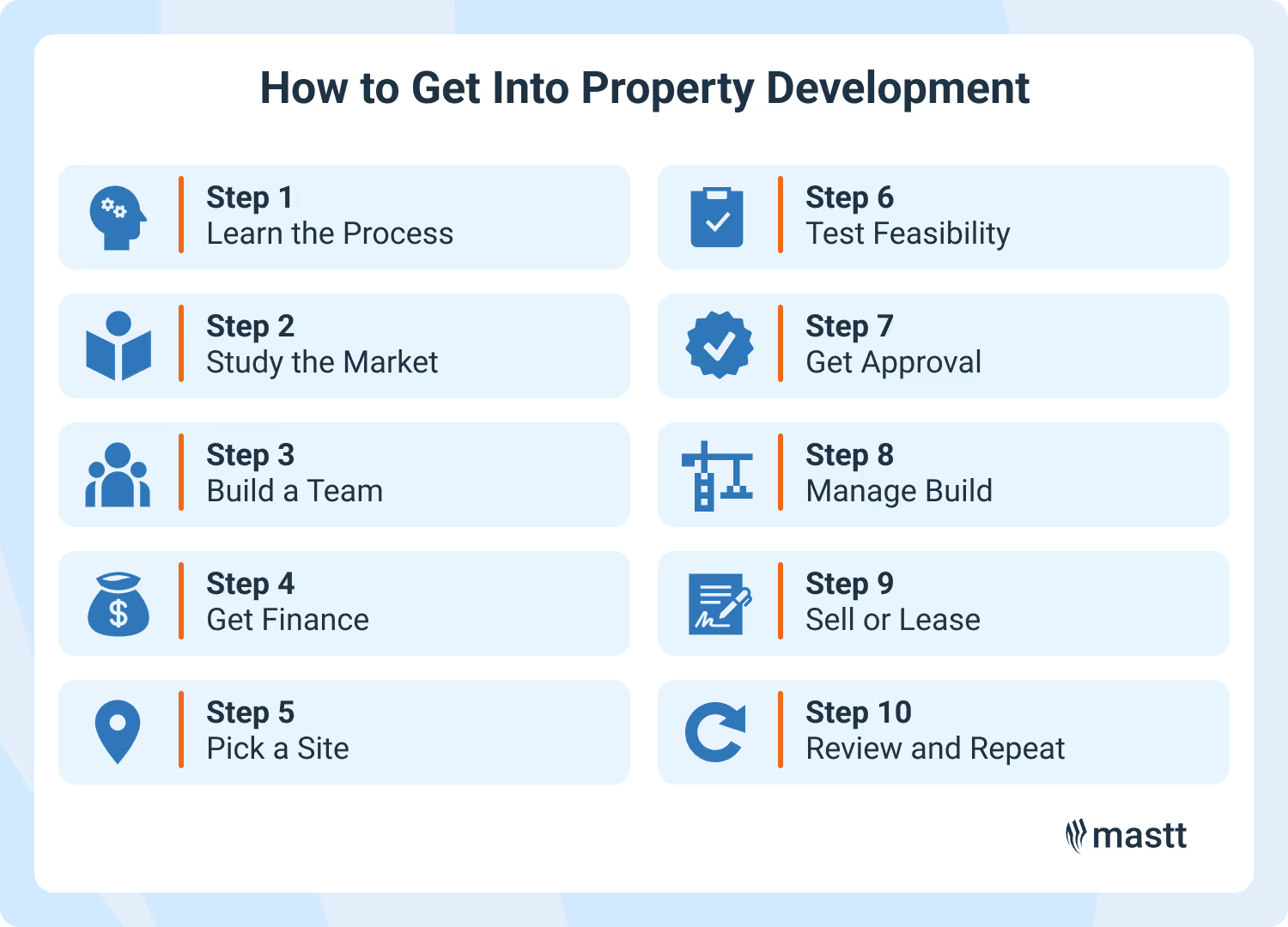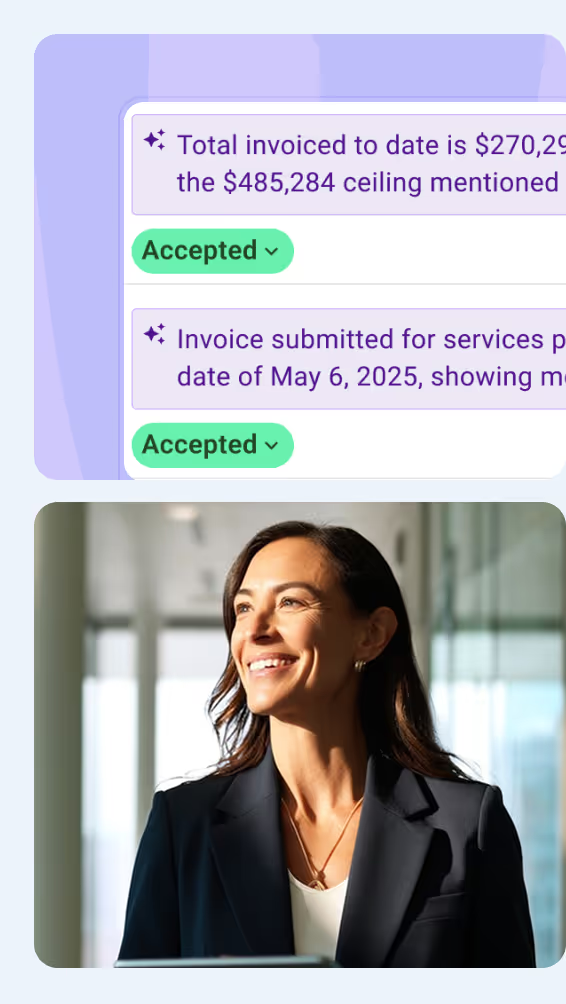To start a property development career in Australia, you need a clear plan and the right skills. You’ll begin by learning the process, building knowledge, and making smart financial moves.
Property development involves creating or improving land or buildings to boost their value. It differs from real estate, which encompasses buying, selling, or leasing existing properties. This article shows you how to get into property development step by step, even without experience or a lot of capital.
Step-by-Step: Getting Into Property Development
To get into property development, you need a plan that reduces risk and builds confidence. Each step in the process builds the knowledge and momentum needed to launch your first project.
These steps help you enter property development without requiring prior experience or substantial capital.
1. Learn the Property Development Process
Understanding the full development lifecycle helps you manage timelines, budgets, and compliance. It lays the groundwork for confident decision-making.
Here’s what to focus on in the early learning phase:
- Learn the stages: acquisition, feasibility, planning, construction, and exit.
- Study common risks and where they occur in each phase.
- Map how each role supports the overall project timeline.
Process knowledge reduces surprises and improves your project leadership.
2. Study the Local Property Market and Zoning Rules
Every suburb has different demand, zoning restrictions, and buyer trends. Knowing the local rules helps you choose profitable sites.
Start by reviewing these key elements:
- Check capital growth, rental yield, and sales activity.
- Review local planning overlays and zoning maps.
- Research buyer preferences in that area.
Local knowledge helps you avoid compliance issues and select better-performing sites.
3. Build Your Property Development Team
A reliable team increases your project’s efficiency and reduces risk. Choose professionals who understand the development landscape.
Key team members to secure early include:
- A town planner to guide permits and zoning.
- A mortgage broker to structure finance.
- A project manager to lead construction and reporting.
The right team prevents costly delays and supports your long-term success.
4. Secure Finance or Use Flexible Funding Models
Finance determines what scale of development you can take on. Use funding strategies that suit your risk profile.
Explore these common finance options:
- Traditional bank development loans with staged drawdowns.
- Joint ventures where investors provide capital.
- Private lending with short-term, asset-based terms.
The funding model you choose directly affects feasibility and project delivery speed.
5. Choose the Right Development Site
The site you choose affects design, timeline, approvals, and resale value. Good sites reduce risk and speed up progress.
Assess each potential site using these factors:
- Location, access, and surrounding infrastructure.
- Planning constraints and flood/fire overlays.
- Resale or rental demand for completed dwellings.
Picking the right site is the fastest way to improve your profit potential.
6. Run a Detailed Feasibility Study
Feasibility shows whether your development makes financial sense. It also helps secure finance and partners.
Key areas to model include:
- Land purchase, construction, approval, holding, and marketing costs.
- Sales price or rental yield, GST, and taxes.
- Interest rate assumptions and timeline buffers.
Accurate feasibility prevents over capitalisation and ensures your project stays viable.
7. Apply for Planning Approval and Permits
Approvals take time and must follow local council rules exactly. Errors here can stall your entire project.
Before lodging your DA, make sure to:
- Align with local planning schemes and overlays.
- Prepare detailed site plans and reports.
- Book a pre-lodgment meeting with the council.
Planning approval moves your project from theory to reality.
8. Manage Construction and Site Supervision
Construction requires constant oversight, documentation, and financial control. Poor management here will hurt your margins.
To stay on top of this phase:
- Hire a licensed builder or project manager.
- Track spend, delays, and variations using software.
- Keep records for claims, disputes, or lender updates.
Good site management protects your timeline and improves project outcomes.
9. Sell or Lease the Completed Property
Exit strategy matters as much as construction. Your cash flow depends on executing this phase well.
Use these methods to maximise return:
- Work with agents who know your product and area.
- Time your sales launch based on market activity.
- Consider leasing if long-term income fits your strategy.
Your final move shapes the overall success and financial return of the project.
10. Reflect, Learn, and Plan the Next Project
Every project teaches something new. Capturing insights now helps scale your development journey faster.
After your project wraps, be sure to:
- Review actual costs vs forecasted costs and timelines.
- Document issues with consultants, councils, or contractors.
- Refine your process and build reusable systems.
Experience compounds when you treat each project as a blueprint for the next.

What Skills Do You Need to Become a Successful Property Developer?
To become a successful property developer, you need practical, learnable skills. These help you manage risk, lead projects, and make smart investment decisions.
Below are essential skills every aspiring property developer should focus on:
These skills form the foundation of successful property development. You don’t need all of them today, but each one helps you move with more clarity and less risk.

What Training Do You Need to Get Into Property Development?
To start in property development, take courses that cover feasibility, finance, planning, and approvals. They give you the skills to make confident, informed decisions across every stage of the development process.
Here are learning options based on your background and goals:
- Graduate Certificate in Property Development: Ideal for upskilling. Covers development finance, feasibility, planning approval, and site risk assessment.
- Diploma of Property Development (TAFE or RTOs): Focuses on zoning laws, site analysis, feasibility modelling, and local council processes.
- Bachelor of Property, Construction, or Urban Development: Best for full-time students or career changers. Includes valuation, construction law, and property economics.
- Master of Property Development (e.g., UTS Online): Designed for future consultants or firm owners. Learn how to lead large-scale projects and manage urban planning.
- Short Courses (TAFE, Property Council Academy): Covers feasibility basics, zoning rules, planning approval, and small-scale development processes.
If you're coming from a real estate background, these courses can offer helpful context and a smoother transition into development:
- Certificate IV in Property Services (Real Estate): Not development-specific. Offers insight into property valuation, marketing, and real estate law.
- Bachelor of Real Estate: Covers agency practice and sales. Helpful for aspiring developers transitioning from the real estate industry.
Select a course that aligns with your schedule, budget, and project objectives. Development-specific training offers the most direct value to aspiring property developers.
Starting Your First Property Development Without Large Capital
Start property development without large capital by using flexible, low-risk funding strategies. These approaches help first-time developers reduce risk, build momentum, and secure finance without needing millions upfront.
Here are practical ways to fund your first property development:
- Joint ventures: Partner with investors who provide capital while you manage the project.
- Sweat equity: Trade your time, skills, or project coordination in exchange for a share in the deal.
- Staged finance: Raise funding in stages, tied to project milestones like approvals or construction phases.
- Development loans: Use property development finance from banks or private lenders, provided you have a solid feasibility plan.
- Property option agreements: Secure a future right to purchase land, giving you time to prepare funding or approvals.
- Private investors: Attract backers by presenting a clear project plan, budget, and projected return on investment.
Many beginners use a mix of these options. The goal is to minimise risk while showing your project delivers value.

Common Mistakes and Fixes for First-Time Property Developers
First-time property developers often encounter planning issues, budgeting errors, and suboptimal site choices. Avoiding these early mistakes can save your project from project delays, cost blowouts, or compliance risks.
Here are the most common beginner property developer mistakes, plus how to fix each:
1. Skipping due diligence: Overlooking zoning laws, site issues, or planning requirements.
✅ Fix: Review the local council’s development control plan and hire a town planner.
2. Underestimating costs: Missing hidden fees like consultant rates, delays, or approval costs.
✅ Fix: Add a 15 - 20% construction contingency to your project budget from the start.
3. Overleveraging finance: Relying on high-risk debt without backup capital or buffers.
✅ Fix: Begin by trimming and exploring joint ventures or staged funding options.
4. Ignoring council rules: Submitting plans that don’t match local building regulations.
✅ Fix: Book a pre-lodgement meeting and clarify all Development Application (DA) requirements early.
5. Misjudging market demand: Building the wrong product for the wrong audience.
✅ Fix: Study recent sales and speak with local agents before finalising your design.
6. Choosing the wrong team: Working with unvetted consultants, builders, or project managers.
✅ Fix: Ask for referrals and check licenses, reviews, and past projects.
7. Trying to do it all alone: Skipping expert help to save on upfront costs.
✅ Fix: Build a team by starting with a good project manager or development consultant.
Avoiding these missteps gives your first development a stronger chance to succeed. Every experienced developer started as a beginner who made better decisions.
What Tools Help You Manage Your First Development Project?
To manage your first property development project, you'll need tools for budgeting, scheduling, reporting, and team coordination. These tools reduce delays, enhance financial visibility, and help keep all stakeholders aligned.
Here’s a breakdown of essential software categories and how they support your development journey:
Mastt is built explicitly for property development and construction project managers. Our property development software brings your approvals, costs, and timelines together in one platform, ideal for both first-time and experienced property developers.
Build Momentum Toward Your First Development Project
Property development in Australia starts with clear actions, realistic goals, and proper support. Each early decision shapes your confidence, capital, and future pipeline.
This career offers you control, financial potential, and the opportunity to create real, lasting value. Plan carefully, take the next step, and grow from project to project.
















